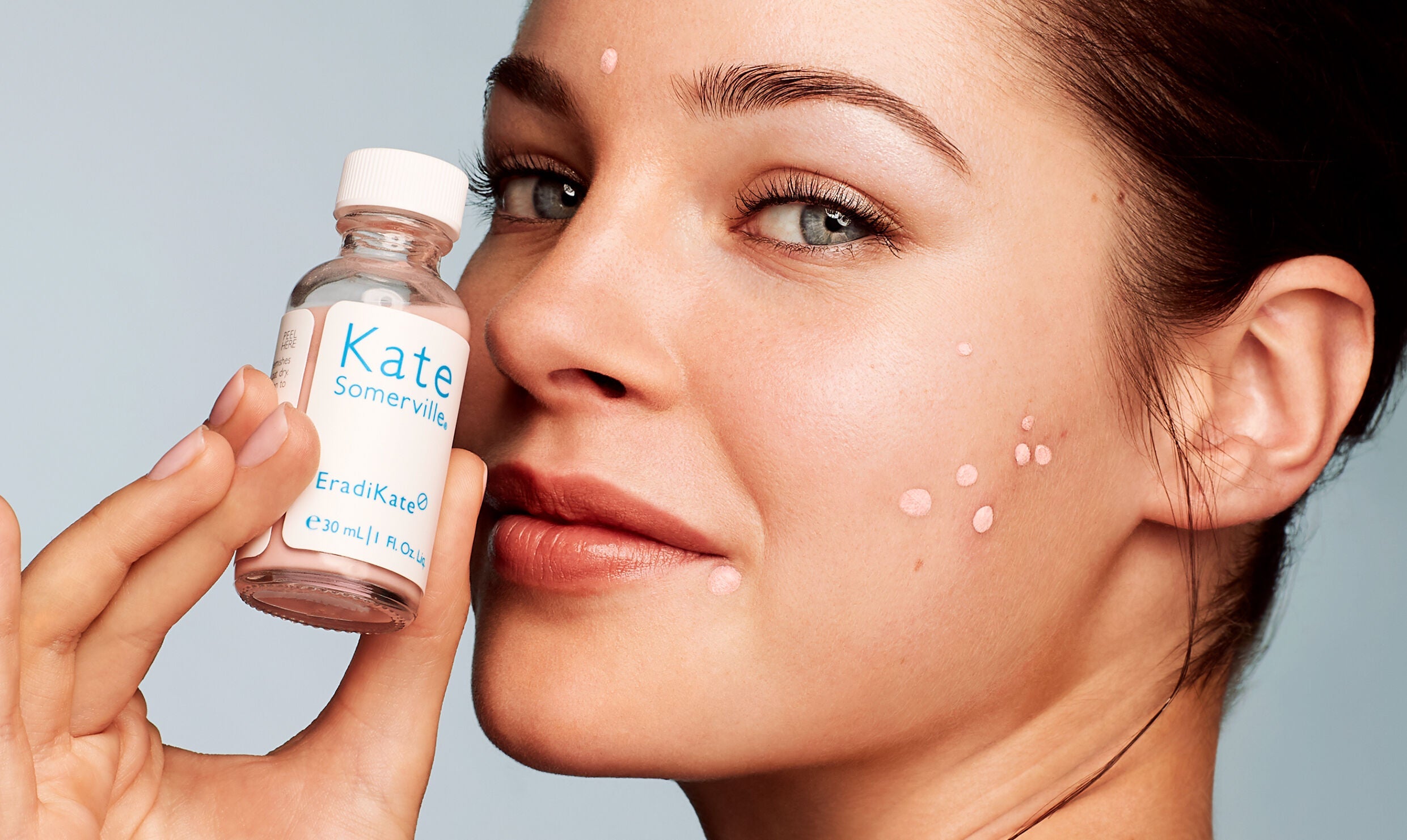
Cystic acne is a highly intense form of acne that displays painful and pus-filled lesions that extend far beneath the skin’s surface. This specific type of acne can be especially difficult to treat, but there are effective methods to help manage and prevent cystic acne breakouts. Our team of Skin Health Experts have hand picked the top five techniques for addressing cystic acne, like changing up your skin care products to add acne fighting ingredients like salicylic acid, benzoyl peroxide, and hydrocortisone.
What causes Cystic Acne?
Severe acne, more specifically cystic acne, can be particularly inflammatory, causing more substantial and uncomfortable outbreaks than other types of acne. Similarly to other types of acne, cystic acne is brought about by various factors:
- Overproduction of oil from overactive oil glands
- Excess dead skin that gets trapped in the pores
- Acne causing bacteria on the skin
Cystic acne in particular is often associated with changes in hormone levels within the body, which can trigger outbreaks during puberty, menstrual cycles, pregnancy, menopause, or other types of hormonal conditions like Polycystic Ovary Syndrome (PCOS).
Cystic or hormonal acne isn’t a struggle you’re facing in solitude – according to the American Academy of Dermatology, nearly 40 million citizens in the U.S. grapple with acne cysts and are looking for ways to treat them properly. However, the treatment method for cystic acne does differ from that for traditional blackheads or whiteheads. To manage cystic acne effectively, it is crucial to establish the fundamental cause of the condition before commencing any treatment. By identifying the root cause of your cystic acne outbreaks, you can take proactive measures to mitigate the chances of future breakouts. Numerous treatment options are available for cystic acne once the underlying cause has been determined.
1) Use a Cleanser Containing Benzoyl Peroxide
The chances are that if you’ve ever tried acne treatment products, you’ve probably already used benzoyl peroxide. FDA approved, benzoyl peroxide products are available over the counter and may also be produced in stronger prescription strengths. To help minimize breakouts, use a cleanser with benzoyl peroxide twice daily. For those extra pesky cystic acne flare-ups, our Anti Bac®️ Acne Clearing Lotion is a great option, as it contains 5% benzoyl peroxide and is formulated to help clear acne-prone skin.
2) Apply a Spot Treatment with Salicylic Acid
Salicylic acid is an ideal ingredient for deep skin exfoliation and works wonders at diminishing the appearance of blackheads and whiteheads. Because of its ability to sweep away dead skin and clear pores, it’s a valuable treatment option for managing cystic acne. Apply a spot treatment containing salicylic acid to any areas where you experience breakouts. The EradiKate®️ Acne Treatment contains 10% sulfur and 2% salicylic acid, making it a powerful spot treatment for cystic acne.
3) Use a Moisturizer with Non-Comedogenic Ingredients
Ensuring your skin is properly hydrated is crucial for any skin care routine, but it’s especially important when battling cystic acne. Facial moisturizers with labels like oil-free, non- comedogenic, and water based are usually a good sign that the product contains ingredients that will not clog your pores. When analyzing the ingredients in your moisturizer, consider opting for one that contains both ceramides and hyaluronic acid to alleviate and hydrate acne-prone skin while easing inflammation associated with breakouts.
4) Consider Using a Hydrocortisone Cream
We know how painful inflamed cystic acne spots can get, and hydrocortisone cream is a great OTC product to help relieve that pain and redness. We recommend applying a very thin layer of cream to any cystic acne bumps to help soothe and minimize the appearance of blemishes. This cream definitely should be used sparingly, overuse can thin your skin and make it even more susceptible to scarring or redness.
5) Take an Oral Medication as Directed by Your Dermatologist
In severe cases of cystic acne, oral medications may be necessary to help manage breakouts. If you’ve tried the traditional methods to curb your cystic acne, it could be time to talk to a dermatologist about more intensive treatments. A dermatologist can determine which medication would be best for you and your unique skin concerns, whether it be through antibiotics, hormonal medications, or isotretinoin (Accutane). If you and your doctor decide an oral medication is the best route for your treatment, it is super important to use the medication only as directed by your dermatologist. Some medications require more closely monitoring certain vitals, so be sure to confirm with your doctor before you start taking any new medication.
In addition to these methods, there are a few additional things you can do to help prevent cystic acne breakouts:
- Avoid touching your face: this can easily transfer bacteria and oil from your hands to your skin
- Cleanse your face twice a day with a gentle cleanser: avoid those super abrasive facial peels or exfoliants so you don’t over irritate your skin
- Be sure to make a habit out of removing your makeup before bed: leaving makeup on overnight periodically can clog your pores and lead to even worse breakouts
Will Cystic Acne Go Away on its Own?
The short answer? Maybe. Cystic acne is usually a stubborn and persistent skin condition that typically requires some sort of intervention, whether that be including benzoyl peroxide products or oral medications from your doctor. If your cystic acne is more mild, there are instances of it being resolved on its own; however, if you’re looking to see significant improvement, you likely will have to intervene in some way.
Without the proper resources and treatment, cystic acne can lead to scarring, further inflammation, and potentially more painful cystic acne spots. We know how difficult it can be to treat cystic acne, but rest assured, with the right intervention, treatment, and resources, there are plenty of effective ways to prevent and treat those pesky breakouts.
When it comes to getting your best skin, trust the Skin Health Experts at Kate Somerville.
Sources:
- Moon M. How to Treat Cystic Acne – Caring for Acne Vulgaris. U.S. Dermatology Partners. Published August 28, 2020. Accessed April 7, 2023. https://www.usdermatologypartners.com/blog/caring-for-cystic-acne/
- Cherney K. Polycystic Ovary Syndrome (PCOS) and Acne: Connection, Treatment, and More. Healthline. Published February 27, 2018. Accessed April 7, 2023. https://www.healthline.com/health/pcos-acne
- Gainder S, Sharma B. Update on management of polycystic ovarian syndrome for dermatologists. Indian Dermatology Online Journal. 2019;10(2):97. doi:https://doi.org/10.4103/idoj.idoj_249_17
- Chuan SS;Chang RJ. Polycystic ovary syndrome and acne. Skin therapy letter. 2015;15(10). Accessed April 14, 2023. https://pubmed.ncbi.nlm.nih.gov/21076799/






